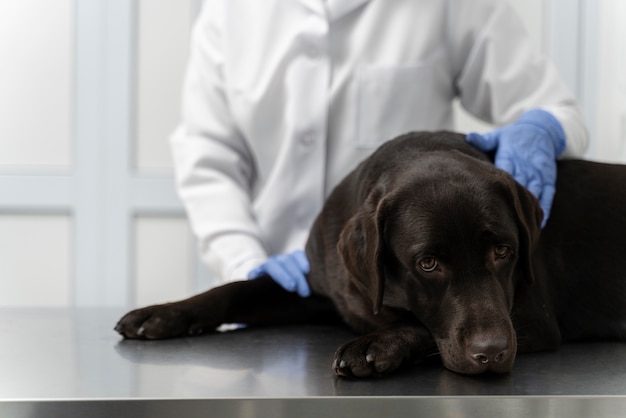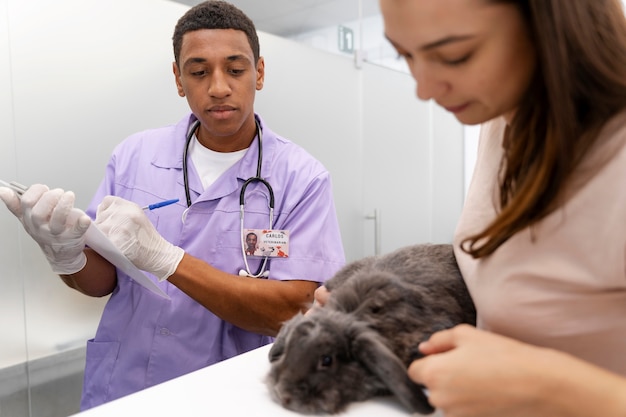Recognizing Signs of Gastrointestinal Upset in Dogs and Cats


Recognizing Signs of Gastrointestinal Upset in Dogs and Cats
If you’ve ever found yourself concerned about your pet’s sudden loss of appetite, an episode of vomiting, or a bout of diarrhea, you are not alone. Digestive troubles are among the most frequent reasons pet owners seek veterinary care, and knowing when to worry can make all the difference for your furry family member. At Crystal Creek Animal Hospital, located at 12110 Crystal Commerce Way, Orlando, FL 32837, our veterinary professionals are dedicated to keeping pets in Orlando and surrounding communities healthy and happy, especially when it comes to issues like gastrointestinal symptoms in pets.
In this blog, we will guide you through the most common signs of digestive upset in dogs and cats, explore the typical causes, and help you understand when it’s time to schedule an appointment with our team for veterinary diagnostics in Orlando. You’ll also discover practical advice for home care and prevention, as well as learn how our advanced diagnostic and treatment options can help get your pet back on track. If you are searching for a "vet near me" to help with pet vomiting and diarrhea in Orlando, this guide offers the insight you need.
Spotting Gastrointestinal Symptoms in Pets: What to Watch For
Recognizing early signs of digestive distress can help you take action before a mild issue becomes a serious concern. Gastrointestinal symptoms in pets can present in a variety of ways, depending on the underlying cause and the individual animal. While some cases may simply be the result of mild dietary indiscretion, other times they can indicate a more serious problem requiring immediate veterinary attention.
Common Symptoms of Digestive Upset
Vomiting and diarrhea are perhaps the most noticeable signs of a gastrointestinal issue, but pet owners should also watch for symptoms such as decreased appetite, abdominal discomfort, excessive drooling, or changes in stool consistency and color. Additional signs include flatulence, lethargy, and uncharacteristic behavior such as restlessness or hiding. In some pets, you might notice weight loss over time, dehydration, or the presence of blood in vomit or stool. These are all indications that your pet could be experiencing digestive distress and may need veterinary diagnostics in Orlando to identify the cause.
When Symptoms Are Subtle
Not all pets will exhibit dramatic signs. For example, cats are known for hiding their discomfort, so you might only notice subtle changes like reduced grooming or increased vocalization. Dogs might be less interested in walks or playtime, or you may observe repeated attempts to vomit without producing anything. Any departure from your pet’s normal routine can serve as an important clue that something is amiss.
Understanding the Causes: Why Digestive Problems Occur
Gastrointestinal symptoms in pets can be triggered by a wide range of factors. Some causes are benign and easily managed, while others are more serious and require professional intervention. Understanding these causes can help you make informed decisions about your pet’s care.
Dietary Indiscretion and Food Sensitivities
One of the most common reasons for pet vomiting and diarrhea in Orlando is dietary indiscretion. Pets, especially dogs, are notorious for eating things they shouldn’t, from table scraps to objects found during walks. Even a sudden change in diet or the introduction of new treats can upset your pet’s digestive balance. Food allergies or sensitivities may also cause chronic gastrointestinal symptoms, resulting in intermittent vomiting, diarrhea, or abdominal discomfort.
Infectious Causes
Viruses, bacteria, and parasites are prevalent in the Orlando area, particularly given the warm, humid climate that supports the spread of pathogens. Parvovirus in puppies, feline panleukopenia in cats, and common parasites such as Giardia or roundworms can all lead to severe digestive upset. These conditions often require immediate veterinary attention, especially in young or immunocompromised pets.
Chronic Illnesses and Underlying Medical Conditions
Sometimes, gastrointestinal symptoms in pets are a sign of a deeper issue, such as kidney or liver disease, pancreatitis, or even certain types of cancer. Chronic illnesses can slowly affect your pet’s digestive tract, leading to gradually worsening symptoms. In older pets, consistent issues with vomiting or diarrhea should always be investigated to rule out serious underlying conditions.
Environmental and Stress-Related Factors
Changes in your pet’s environment, such as moving to a new home, the addition of a new family member, or even travel, can lead to stress-induced digestive problems. Some pets develop colitis, an inflammation of the colon, when stressed, resulting in sudden bouts of diarrhea. Seasonal changes, like Orlando’s summer storms, may also contribute to anxiety-driven digestive issues.
How Veterinary Diagnostics in Orlando Help Identify the Problem
When your pet is showing signs of digestive upset, professional evaluation is the safest way to determine the cause and provide effective treatment. At Crystal Creek Animal Hospital, our veterinary team uses a variety of advanced diagnostic tools to get to the root of your pet’s symptoms and create a targeted treatment plan.
What to Expect During Your Visit
During your appointment, our veterinarians will begin with a thorough physical examination, followed by questions about your pet’s recent behavior, diet, and exposure to potential toxins or infectious agents. Based on symptoms and history, we may recommend testing such as bloodwork, fecal exams, or urinalysis to assess organ function and check for infections or parasites. Imaging techniques, including abdominal ultrasound, can provide a detailed look at internal organs, helping us identify blockages, masses, or inflammation.
In certain cases, more specialized procedures like endoscopy may be necessary to visually examine the gastrointestinal tract and collect biopsy samples. Our in-house pet diagnostic lab ensures rapid results, allowing us to start treatment as soon as possible.
Treatment Options for Gastrointestinal Symptoms
Treatment for gastrointestinal symptoms in pets depends on the underlying cause. For mild dietary indiscretion, supportive care such as fluid therapy, probiotics, and dietary adjustments may be sufficient. If an infection or parasite is identified, targeted medications will be prescribed to eliminate the problem.
For pets with chronic or severe conditions, additional interventions like intravenous fluids, anti-nausea medications, or specialized diets may be recommended. In rare cases, surgical intervention may be necessary if there is a blockage or mass causing the symptoms. Our veterinary professionals are equipped to provide comprehensive care, including advanced internal surgery when needed, to support your pet’s recovery.
Home Care and Prevention: Helping Your Pet Stay Healthy
While some causes of digestive upset are unavoidable, many can be prevented with attentive care and a watchful eye. Taking proactive steps at home can go a long way toward keeping your pet’s digestive system healthy.
Dietary Management and Environmental Safety
Feeding your pet a consistent, high-quality diet and avoiding sudden changes in food can help minimize gastrointestinal upset. Be mindful of what your pet has access to, both indoors and outdoors, as many common household items and plants can be toxic if ingested. Supervising your pet closely during walks and discouraging scavenging behavior are also important preventive measures.
Stress Reduction and Routine Wellness Care
Minimizing stress through the use of routine, consistent schedules and providing safe, quiet spaces for your pet can help reduce anxiety-related digestive issues. Regular wellness examinations are essential for early detection of underlying health problems that may cause gastrointestinal symptoms. Our veterinary team can help you create a preventive care plan tailored to your pet’s unique needs.
Monitoring and Early Intervention
Keeping a close eye on your pet’s appetite, stool quality, and energy levels allows you to spot potential problems early. If you notice persistent vomiting, diarrhea, or other signs of gastrointestinal distress, prompt veterinary diagnostics in Orlando can help ensure that your pet receives timely and effective care.
When to Seek Veterinary Care for Gastrointestinal Symptoms
Knowing when to contact your veterinarian can be challenging, especially if your pet’s symptoms seem mild or intermittent. However, certain situations always warrant professional evaluation.
Red Flags That Require Immediate Attention
If your pet experiences repeated vomiting or diarrhea, signs of dehydration (such as dry gums or sunken eyes), blood in vomit or stool, severe lethargy, or signs of abdominal pain, you should contact Crystal Creek Animal Hospital right away. Young puppies and kittens, senior pets, and animals with pre-existing health conditions are especially vulnerable and should be seen promptly if symptoms occur.
For less urgent cases, like a single episode of mild vomiting or diarrhea, you can monitor your pet at home while providing bland, easily digestible food and plenty of fresh water. However, if symptoms persist for more than 24 hours, worsen, or are accompanied by other concerning signs, it’s best to schedule an appointment for veterinary diagnostics in Orlando.
Our veterinary professionals are here to guide you through the next steps, whether your pet needs immediate intervention or a thorough wellness evaluation to uncover the root of chronic symptoms.
Compassionate Veterinary Diagnostics in Orlando: Your Partner in Pet Health
Gastrointestinal symptoms in pets can be alarming, but with attentive observation and prompt veterinary care, most digestive issues can be managed effectively. At Crystal Creek Animal Hospital, our veterinarians are committed to providing compassionate, comprehensive care for every patient, whether you live in Orlando or the surrounding communities. If you’re searching for a "vet near me" that you can trust, our team is here to help you navigate everything from mild stomach upset to more serious conditions.
If you notice signs of pet vomiting and diarrhea, do not hesitate to contact our experienced veterinary team for a thorough wellness examination or pet diagnostic lab testing. We encourage you to schedule an appointment at our Orlando location or call us at (407) 203-0741 for personalized guidance and support. Our goal is to be the best veterinarian near me for you and your pet, providing quality veterinary diagnostics in Orlando and ensuring your furry companion receives the care they deserve.
For more information on how we can help your pet with gastrointestinal symptoms in pets, visit our website or reach out to our veterinary team today. Your pet’s wellbeing is always our top priority.
This blog is intended for informational purposes only and should not be considered a substitute for professional veterinary advice. If your pet is experiencing severe or persistent symptoms, please consult a veterinarian as soon as possible.


















